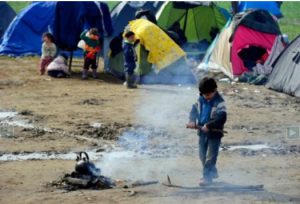TOLERANCE AND SOLIDARITY .
An article from Education International (reprinted according to provisions of Creative Commons)
Confronted with a dramatic increase of refugees from neighbouring countries in conflict, the Greek Federation of Secondary State School Teachers is calling for solidarity to see that all children receive an education.
The Greek Federation of Secondary State School Teachers (OLME) President and General Secretary are urging the Greek Government to seek special funding to cover the costs of creating proper reception and accommodation centres for refugees. These centres are to provide food, health care, translation and legal services in decent living conditions. The OLME also asked the Government to ensure access to education for all children who will remain in Greece, adding that the necessary infrastructure and proper conditions should be provided for their smooth transition.

Photo © UN
A lost generation
The union’s call comes as a recent UNICEF report, ‘Education Under Fire,’ exposed the harsh reality facing refugees, in particular children. It stated that, due to the wars in the Middle East and North Africa, 13 million children have been left without access to education. In addition, 9,000 schools in the Middle East are not operating and about 700,000 refugee children do not attend school because the existing school facilities cannot accommodate the increased number of additional schoolchildren.
Since the Balkan states closed their borders in March, thousands of refugee children in Greece have had little or no access to education. Rights organisations have warned of a “lost generation” of refugee children missing out on education.
OLME: Call for solidarity and dialogue
“We invite the local teacher unions and the teachers to lead the way once again,” said the OLME leadership in its 18 September statement. “We invite them to show their solidarity to refugees and immigrants in a concrete manner by organising or joining actions that aim to provide all kinds of material and moral support to refugees. At the same time, we invite them to lead discussions within the school community aiming to make young people aware of the issues pertaining to refugees and immigrants. Racist perceptions and discrimination against refugees and immigrants have no place within the education system nor within the Greek society.”
In response, local teacher unions, schools, and students have undertaken various initiatives showing their solidarity towards refugees.
(Article continued in right column)
(Click here for a French version of this article or here for a Spanish version)
The refugee crisis, Who is responsible?
(Article continued from left column)
Financial assistance
The OLME Executive Board has allocated funding to local teacher unions directly experiencing a higher influx of refugees; this funding is to be used to secure humanitarian aid. OLME intends to support mobilisations along with the people’s movement, to support every effort stemming either from schools or the wider social context to consolidate a society of freedom, equality and respect for human rights.
“Funding is key to the implementation of the above-mentioned educational plan,” said the OLME leadership. To date, €7 million has been used for the construction of host centres, training of teachers and teacher trainers, and the production of school textbooks. Moreover, €2.8 million is to be provided by the International Organisation for Migration to pay for children’s transportation to and from reception classes and school cleaning until December 2016.
Long-term plans
In addition, the Greek Ministry of Education hasdeveloped an induction programme for refugee children within the Greek formal educational system, addressing educational and pedagogical considerations. Of the 27,000 refugee children stranded in Greece, at least 18,000 are thought to be of school age. For the past seven months, children in camps have only had access to casual volunteer-run classes. The Ministry estimates that, towards end-September, the first reception classes will begin and other ‘regular’ classes will gradually follow, with thousands of refugee and migrant children being enrolled in Greek schools.
Meanwhile, teachers appointed to refugee reception classes and host centres for the education of refugees are receiving special training. Since the number of Greek teachers qualified to teach the children’s native languages is not sufficient, the Ministry has invited NGOs to contribute human resources.
The OLME is adamant, however, that this initial stage of reception classes should be followed by the integration of all refugee children within the mainstream school community.
EI refugee conference
Education International will be holding a conference, on the theme “Education of refugee children – Fast track to equal opportunities and integration” from 21-22 November in Stockholm, Sweden. This event will be a unique opportunity to showcase education unions’ work worldwide to ensure that refugee and migrant children get a proper education. It will also highlight unions’ efforts to ensure that refugee and migrant teachers receive good training and work and living conditions. And it will reaffirm that education is a human right of which nobody should be deprived, regardless of their circumstances.
(Thank you to Janet Hudgins, the CPNN reporter for this article)